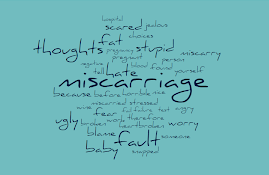Dealing with Negative Thoughts
How many of us are guilty of having those automatic negative thoughts (the acronym for this is ANTs – and how annoying are ANTs)? Here are some ways of dealing with those annoying ANTs.
I know for me, especially following my miscarriage, I had them running around my head almost constantly. Those thoughts where you tell yourself it’s my fault I miscarried because, before I found out that I was pregnant I had a glass of wine, or that it’s my fault because I was stressed at work or I snapped at someone, therefore I’m not a nice person, I’m fat, I’m horrible, I’m stupid, I’m ugly.

Here you will find some ideas on how to deal with them.
Firstly, it is normal to have these thoughts. With miscarriage it is very hard to identify (even with testing) why someone has miscarried and we, as human beings try to fill in the blanks, therefore, we look at what we did or didn’t do leading up to the miscarriage. If you had a missed miscarriage you may have been able to pinpoint the exact date your baby stopped growing and pour back through your diary and Social Media posts to find out what you did that day. We try to find a reason why this awful thing happened to us. A lot of the time, you won’t be able to pinpoint a reason and even if you do, is that factual, is there any evidence? So without solid evidence we start to blame ourselves and that’s when those thoughts pop into our mind.
So how do you stop them?
Honestly, you can’t. But what we can do is control what we focus on. Having negative thoughts is often a vicious circle. Those thoughts produce feelings, those feelings affect the choices we make. The choices we make decide the outcomes we get, and those outcomes… yep they conjure up more thoughts.
So what can you do?
In the short term, you could apply something called thought stopping or distraction. So when those thoughts pop into your mind you do an action to stop them or to distract yourself. These can be:
- Shouting/Saying/thinking STOP! Dependant on the situation and environment – no one should be yelling STOP! In the middle of their local supermarket!
- finger tapping – This can be against the side of your thigh so as to be discreet
- Counting backwards from 100, deep breathing exercises
- I forgive myself, I am safe, I am a good person
When applying thought stopping it is a good idea, where possible to close your eyes and focus exclusively on the distraction technique. This may be something that you have to practice regularly. If one of these techniques doesn’t work for you then try another.

In the longer term, you can use a thought or feeling diary. This is the complete opposite of the short term as it requires you to really examine your thoughts. You can also use the thought diary for any triggers. Basically, this can help you police your thoughts and look at them more logically. It is only when we really look at the thoughts that we are able to identify them and come up with a way of altering them.
We have a form like this:

It might be that someone else’s actions have upset you.
It is important to consider that we never know anyone else’s true thoughts unless they decide to share them with us and even then they may be censored. If you are angry or upset by another person’s actions remember that we don’t know what is going on with them, in their life, in their thoughts.
This thought diary doesn’t have to be used based solely on your thoughts following miscarriage. If you are having any negative thoughts it is a good idea to use something like this. Remember: Having negative thoughts is often a vicious circle. Those thoughts produce feelings, those feelings affect the choices we make. The choices we make decide the outcomes we get and those outcomes conjure up more thoughts.
To access this thought/emotion diary to print off and use at home please visit our website. I discuss this in further detail over on our YouTube channel.
You can also seek support in the form of counselling. Counsellors are trained to help you delve into those thoughts and get to the root of why they are there and can work with you to banish them.
It may take time and practice do deal with those ANTs but with a little patience they should become fewer and farther between.

